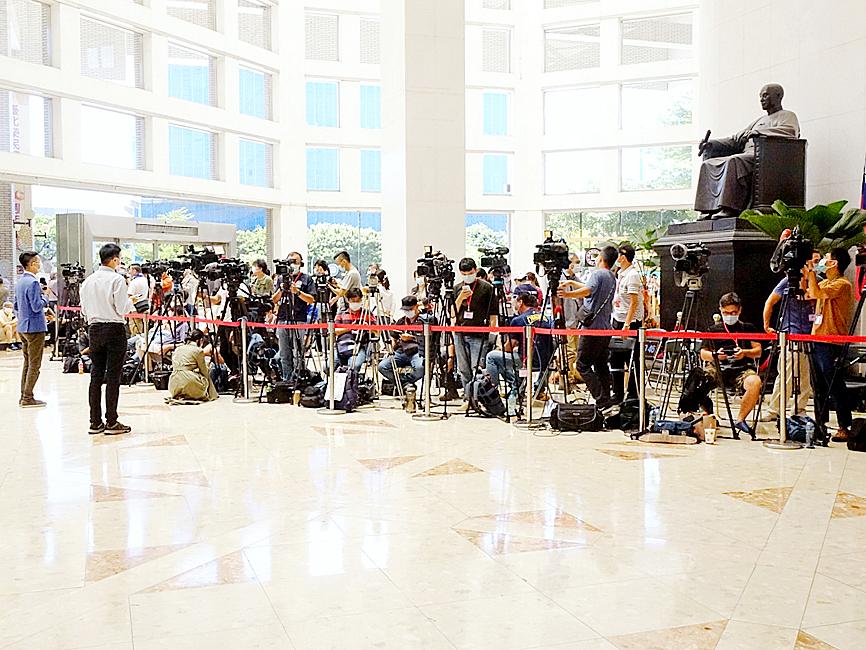Taipei Veterans General Hospital yesterday rebutted speculation that former president Lee Teng-hui (李登輝) had died a day earlier, saying that he was weak, but receiving treatment.
The hospital said the 97-year-old Lee was not in good condition and needed ongoing care, adding that if there are any changes in his condition, it would make those public.
The comments came after rumors emerged online on Tuesday that Lee had died after being hospitalized since early February.

Photo: Chu Pei-hsiung, Taipei Times
Soon after the unsubstantiated rumors emerged, reporters started flocking to the hospital seeking confirmation.
Lee was admitted to Taipei Veterans General Hospital on Feb. 8 after choking while drinking milk. He was diagnosed with pulmonary infiltration and has since been intubated.
The hospital has been tight-lipped about Lee’s condition, but speculation has been rife that his health has deteriorated over the past few months.
A source inside the hospital told the Central News Agency that Lee’s health has been unstable for a long time, and that his condition could change for the worse at any time.
Lee’s condition has become more unstable recently, the source said, adding that medical personnel are providing the care necessary to keep his condition in check.
Before the hospital issued its statement, the pro-independence Taiwan Solidarity Union (TSU), which Lee founded, dismissed rumors of Lee’s death in a Facebook post.
President Tsai Ing-wen (蔡英文), Vice President William Lai (賴清德) and Premier Su Tseng-chang (蘇貞昌) visited Lee yesterday morning.
Born under Japanese colonial rule, Lee was educated in Japan and the US, and cultivated by the Chinese Nationalist Party (KMT) to succeed former president Chiang Ching-kuo (蔣經國).
Later in life, he became a prominent advocate for Taiwanese identity and statehood, founding the TSU.
In 2001, Lee was expelled from the KMT for stumping for a TSU legislative candidate and lending support to the Democratic Progressive Party.

A magnitude 5.6 earthquake struck off the coast of Yilan County at 12:37pm today, with clear shaking felt across much of northern Taiwan. There were no immediate reports of damage. The epicenter of the quake was 16.9km east-southeast of Yilan County Hall offshore at a depth of 66.8km, Central Weather Administration (CWA) data showed. The maximum intensity registered at a 4 in Yilan County’s Nanao Township (南澳) on Taiwan’s seven-tier scale. Other parts of Yilan, as well as certain areas of Hualien County, Taipei, New Taipei City, Taoyuan, Hsinchu County, Taichung and Miaoli County, recorded intensities of 3. Residents of Yilan County and Taipei received

TRUST: The KMT said it respected the US’ timing and considerations, and hoped it would continue to honor its commitments to helping Taiwan bolster its defenses and deterrence US President Donald Trump is delaying a multibillion-dollar arms sale to Taiwan to ensure his visit to Beijing is successful, a New York Times report said. The weapons sales package has stalled in the US Department of State, the report said, citing US officials it did not identify. The White House has told agencies not to push forward ahead of Trump’s meeting with Chinese President Xi Jinping (習近平), it said. The two last month held a phone call to discuss trade and geopolitical flashpoints ahead of the summit. Xi raised the Taiwan issue and urged the US to handle arms sales to

Taiwan has secured another breakthrough in fruit exports, with jujubes, dragon fruit and lychees approved for shipment to the EU, the Ministry of Agriculture said yesterday. The Animal and Plant Health Inspection Agency on Thursday received formal notification of the approval from the EU, the ministry said, adding that the decision was expected to expand Taiwanese fruit producers’ access to high-end European markets. Taiwan exported 126 tonnes of lychees last year, valued at US$1.48 million, with Japan accounting for 102 tonnes. Other export destinations included New Zealand, Hong Kong, the US and Australia, ministry data showed. Jujube exports totaled 103 tonnes, valued at

BIG SPENDERS: Foreign investors bought the most Taiwan equities since 2005, signaling confidence that an AI boom would continue to benefit chipmakers Taiwan Semiconductor Manufacturing Co’s (TSMC, 台積電) market capitalization swelled to US$2 trillion for the first time following a 4.25 percent rally in its American depositary receipts (ADR) overnight, putting the world’s biggest contract chipmaker sixth on the list of the world’s biggest companies by market capitalization, just behind Amazon.com Inc. The site CompaniesMarketcap.com ranked TSMC ahead of Saudi Aramco and Meta Platforms Inc. The Taiwanese company’s ADRs on Tuesday surged to US$385.75 on the New York Stock Exchange, as strong demand for artificial intelligence (AI) applications led to chip supply constraints and boost revenue growth to record-breaking levels. Each TSMC ADR represents